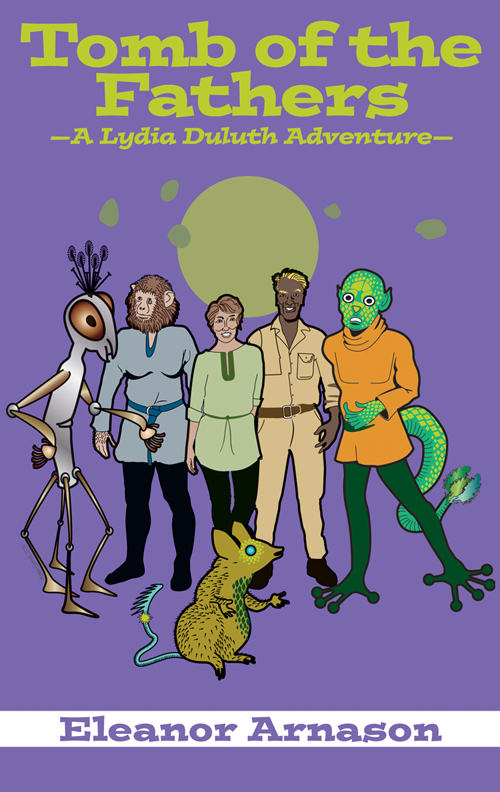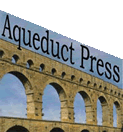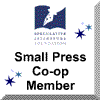Tomb of the Fathersby Eleanor Arnason
In this witty romp of a planetary romance, Arnason's recurring character Lydia Duluth joins a motley crew of intergalactic travelers to explore the long-lost homeworld of the Atch, who have a mysterious history they'd like to keep buried on the planet they left behind. But the expedition goes awry when a rogue AI, determined to keep the planet and its system quarantined, destroys the star-gate, stranding the expedition on the planet. The travelers encounter the native Atch and discover the Tomb of the Fathers—and see firsthand what can happen when childcare becomes the dominant issue for a species. Advance Praise"Eleanor Arnason is a treasure," writes Andrea Hairston, the award-winning author of Mindscape. "Why? She knows her craft, respects her audience, and has a dazzling imagination. She entertains us with fearless writing. Tomb of the Fathers is an elegant thought experiment on gender, class, and ethics. An interstellar comedy of errors, Tomb of the Fathers is laugh out loud funny and also a thought-provoking thriller. Arnason's deft universe-building transported me to the great beyond where I delighted in the company of complex, juicy characters who—whether human, humanoid, machine, or genetic mash-up—bared their souls. Tomb of the Fathers is the space adventure you've been dying to read. At the last page, I wanted more. Indeed, my only complaint is that I want a sequel now!" And Carolyn Gilman, author of Halfway Human, says "Fair warning: don't open this book unless you're prepared to spend the next few hours in a world of Marxist aliens, sentient spacesuits, topsy turvy gender relations, and eyes-glued-to-the-page adventure. Eleanor Arnason writes fast-paced space drama riddled with wry humor and social commentary. Heavens, it's tasty." Reviews
Lydia Duluth—interstellar traveler, holovid location scout, and star of
several of Arnason's short stories—explores the purported lost home world
of the matriarchal, lizardlike Atch in this stand-alone adventure. She's
joined by her occasional lover Olaf Reykjavik; Vagina "Gina" Dentata, a
modified pseudo-ape; Precious Bin, a male Atch; and several artificial
intelligences (one of which resides in her head). Lydia discovers warlike
female Atch descendants who have killed off the males and now reproduce by
cloning, but when she and her team try to leave, they're trapped by a
slightly barmy AI intent on keeping the violent Atch from traveling in
space. Fans of Arnason's dry wit, entertaining character interactions, and
complex, imaginative futures will be delighted by this tale and the promise
of a forthcoming Lydia Duluth collection.
The true charm of this story lies in its reversal of gender
stereotypes. The Atch homeworld, populated entirely by females, is far from
a matriarchal paradise. Of course, this is because they can reproduce only
by cloning, Atch females being unequipped for childbearing. A short novel,
but thought-provoking and entertaining.
(read the whole review)
Here's a clever and quite original planetary adventure. A crew of humans
and aliens is conducting research on a planet supposedly abandoned by its
intelligent residents when a malfunctioning AI decides to strand them
there. In short order they begin to uncover secrets about the decline of
the alien civilization, which mixes the serious and the humorous in about
equal measure, and yes there's considerable social commentary mixed in with
the laughs and surprises. It's quite short—not much more than a novella—so the satire doesn't get too long winded, and there's an active plot as
well. Have a few laughs and look at human behavior from a slightly
different viewpoint.
Eleanor Arnason is a brilliant science fiction writer. She writes fluidly and movingly. Her novel, Woman of the Iron People from 1991 is a must read for any SF aficionado who enjoys truly interesting alien societies.
Ms. Arnason has concentrated on three series in recent years and post-1993
they have been furthered as several short fiction tales. She is,
unfortunately, not prolific, but that only means that her fans (among whom
I count myself) look forward to reading each new offering with
anticipation.
(read the whole review)
In the interests of self-disclosure, I suppose I should admit that I have been mad for the fiction of Eleanor Arnason since I first came across it back in the nineties. What I found in that first story, "Knapsack Poems," and in all the rest of her work, which I rapidly sought out, is that quality which first drew me to science fiction, and that which continues to draws me back to science fiction above all other forms of literature: the ability to imagine the world in some other way... ...Lydia Duluth, the point of view character in this novel, is a continuing character for Arnason; further, this type of story, a collection of varied characters on a journey through a landscape alien to most of them, is one she has told before, most successfully in Woman of the Iron People (1991). But despite some similarities between these two narratives (Lydia/Lixia for our POV characters; also, the human male in the mix, Olaf, is much like Derek from WoIP, as Bin, the Atch, is similar to Voice of the Waterfall from WoIP), Tomb of the Fathers is fresh enough and, more importantly, Arnason's writing and her ideas strong enough, to carry the novel...
...Too often, lately, science fiction writers have been telling us all we can reasonably hope for is a rebuilt past. Here in these books, as in all her fiction, Eleanor Arnason offers dreams of better ways.
(read the whole review)
Arnason has a dry humor and a well-developed sense of the absurd. Her take
on human foibles is reminiscent of Pamela Sargent's "Danny Goes to Mars"
(1993). Conceptually, Tomb resembles Le Guin's "Sur" (1983) and Joan
Slonczewski's The Children Star (1998). Although Tomb of the
Fathers is deceptively short and mild-mannered, Arnason is a master
storyteller, demonstrating craft and craft—creating engaging
characters and steering her story craftily through a moral and
political agenda without being too intrusive and thought provoking
enough to inspire other grand conversations.
(read the whole review)
ISBN: 978-1-933500-36-2 (13 digit)
|

